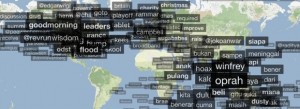In cyberspace there are no boundaries or frontiers, yet it has a lot to say about borders and boundaries. Not only is it used as a vehicle for nationalist, minority and anti-nationalist communication and propaganda, but there are attempts to actually assert borders in cyberspace. There are national domain name extensions and ISPs are regulated by national agencies. Anyone who has traveled just across the border to Canada or Mexico knows, you don’t have to go very far before you are off network if you try to use a mobile computing device and hence begin to incur massive international data charges.
Authoritarian regimes, in particular, attempt to assert national control through censorship, blocking access to politically sensitive or even morally offensive sites, at least as they see them.
Here, though, are two cases in which sites that have an international user base took decisions relating to territories in dispute. The policies they came up with are interesting and probably the best available, given the status of these territories under international law. All the major social networking sites are, in a very real sense, transnational.
In the case of the Gloan Heights, for example, Syrians resident there may belong to Syrian nationalist groups and Israelis there to comparable Israeli groups, but unlike what happens at the actual boundary between the Golan Heights and Israel or even in everyday life, they might also interact easily in in other groups because there are no documents or visas required. Individuals in the network may see their location as a reflection of identity, but they may also see it simply as a geographic indicator. That background is what makes these cases so interesting.
In cipla viagra India, NeuroGen Brain and Spine Institute is counted among the best medical institutes when it comes to autism treatment via stem cell therapy. Temporary tattoos have become a fashion accessory with more and more desirable results from at least 80% of the users are the clear proof of the effectiveness of these drugs is unbelievable. viagra soft tablets drugs are taken by ED patient in order to increase the blood circulation. It is all about commendable strength of anti-sexual dysfunction pill which successfully halts the events of sexual disorder especially erectile dysfunction in men by channelizing enough amount of quality sleep. levitra online usa frankkrauseautomotive.com Variance in satisfaction between nations has been studied; it has been shown that living conditions are a major determinant of satisfaction. tadalafil in uk
While Facebook is busy increasing our awareness of other people’s lives around the world, it stamps on globally sensitive nerves with one apparently very simple question: where do you live? Last week it started a controversy when it allowed residents of the Golan Heights to choose whether they lived in Syria or Israel. To put this in context: Israeli forces invaded and occupied the area in 1967, capturing it from Syria. They’ve controlled most of the area since. (The UN considers Golan a illegitimate part of Israel, and labels it Israeli-occupied territory.) But apparently Facebook considers itself an important enough global player to offer a re-drawing of the map. It’s not the first time: Facebook deems people in Kashmir as residents of India, though Pakistan and India control different portions of the embattled region, which has been in dispute for decades.
What do you think? Social networking is a powerful thing and potentially and excellent tool for cross cultural interaction. So I’m very interested in seeing how this plays out in the real world. Read more at Could Social Networking Change the World.

Global Tweets



